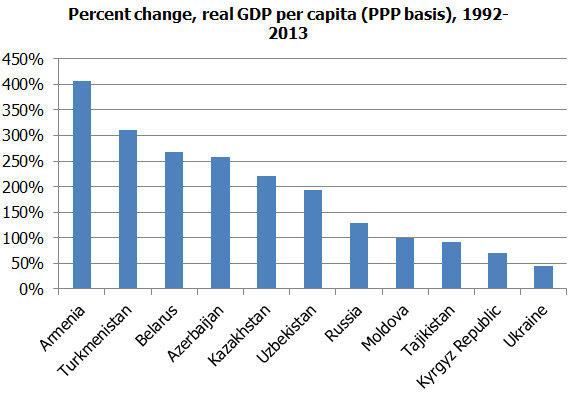The long standoff between Russia and the US on the annexation of Crimea by the former had made it difficult for Ukraine to receive international aid. However, the crisis-stricken nation recently received some motivating financial news – the tentative approval of up to $18 billion by IMF. Even though Ukraine had been in dire need of the funds for over two years, the divided nation had been torn between forging close ties with Russia or the EU.
This had made situations difficult for approval of the funds. In a quick response to the International Monetary Fund’s move, the US Congress supported Ukraine by voting for a $1 billion package of the USAID (“Welcome Help for Ukraine” A26). Having agreed to form close links with the West, European nations have responded with contributions of approximately $9 billion to help Ukraine to rebuild its economy as well as its democratic practices.
In moving to cut Crimea from Ukraine, Russian President Vladimir Putin went against the international law and disrespected Ukraine’s sovereignty. The impasse in Ukraine is escalated by Russia’s version of the country’s history; Vladimir Putin believes that Ukraine was part of Russia, and most occupants of the Crimea area are of Russian origin. Russia’s invasion of this part of Ukraine simply raised tension in the region, and other parts of Ukraine as well.
Even though the EU had limited options and minimal likelihoods of coercing Vladimir Putin to keep off Crimea, the vote by the United Nations General Assembly rebuking Russia’s aggression was major political support for Ukraine. Clearly, for peace to prevail in the country, international support is vital.
From the results of the Crimea vote, 100 votes rebuking Putin’s illegal act, 11 supporting, and 58 abstaining, it is evident that the annexation of Crimea was a Russia’s affair, and not an international dispute (“Welcome Help for Ukraine” A26). If Russia is a member of the United Nations, it means that it subscribes to its principles and rulings. Therefore, for such a vote, Mr. Putin should withdraw the forces from Ukraine to allow the country to embark on rebuilding its economic foundation and strengthen its democracy.
On the other front, the global crisis had put pressure on the hryvnia, making the currency to lose value against the dollar. In a move to protect hryvnia, the central bank used most of its reserves, thus decreasing the value to $12 billion at present from $ 40 billion in 2011. At the time of the signing of the EU agreement, currency depreciation, huge debt burden, and unsteady flow of capital were the major economic headaches of Ukraine (Riegert par. 3).
The country needs a favorable environment to support the development of its dilapidated sectors. This makes it necessary for the possible entry of NATO into the issue, as well as the US to punish Mr. Putin for violating international laws.
So delicate is Ukraine’s situation given that Russia commands an economic following not only in the Asian Continent but also among some European nations. Therefore, the reluctance by President Obama and NATO to isolate Russia from key economic groups, international conferences, and scrap the EU’s joint energy supply stratagem is premeditated. Another obstacle to the restrictions and sanctions on Russia is the multi-billions of dollars that the country generates an annual turnover to the EU.
Therefore, applying sanctions to Russia will definitely have an impact on both sides of the divide. Markedly, Russia exports two-thirds of its energy to the EU; for countries in the Baltic region, Russia is the sole supplier of energy. Notably, Ukraine is also not a NATO member. From this scenario, the use of force by NATO is out of the question. This makes Russia exploit diplomatic relations since it knows that applying sanctions or going to war over Crimea will affect even the neutral nations (Riegert par. 7).
Even though pursuing a diplomatic solution to Ukraine’s case might expose Russia as a superpower, the US and EU have to understand that going to war over Ukraine will cause more destructions than engaging in dialogue. On the other hand, Vladimir Putin has to respect international agreements and regulations.
The Ukrainian problem is just mere respect of a country’s sovereignty. In addition, in failing to understand the effects of asset freezes, non-approval of trading licenses, and travel bans on certain Ukrainian and Russian tycoons, the President is acting in a barbaric manner (Llana n.pag). Even the economy minister assented that such moves will slow Russia’s economic growth, as funds will be held abroad – not free to circulate into the country.
It is high time for President Vladimir Putin to consider the state of Ukraine’s econmy along with the international links that his actions are likely to cause Russia and its citizens. At this time, Ukraine should be at the point of receiving support from many international organizations and regional neighbors like Russia. Ukraine’s interim government also needs non-financial support, such as financial management to assist them in setting key priorities for quick economic growth.
With Ukraine, Russia, the US and EU having a common membership in OSCE (Llana n.pag), they can use it as a podium to engage each other to prevent Ukraine from falling into economic shambles.

Works Cited
Llana, Sara Miller. “Ukraine finally signs the EU deal that started it all.” The Christian Science Monitor [Boston] 2014: n. pag. Web.
Riegert, Bernd. EU faces a dilemma in Ukraine negotiations. 2014. Web.
“Welcome Help for Ukraine.” The New York Times [Washington] 2014: A26. Web.